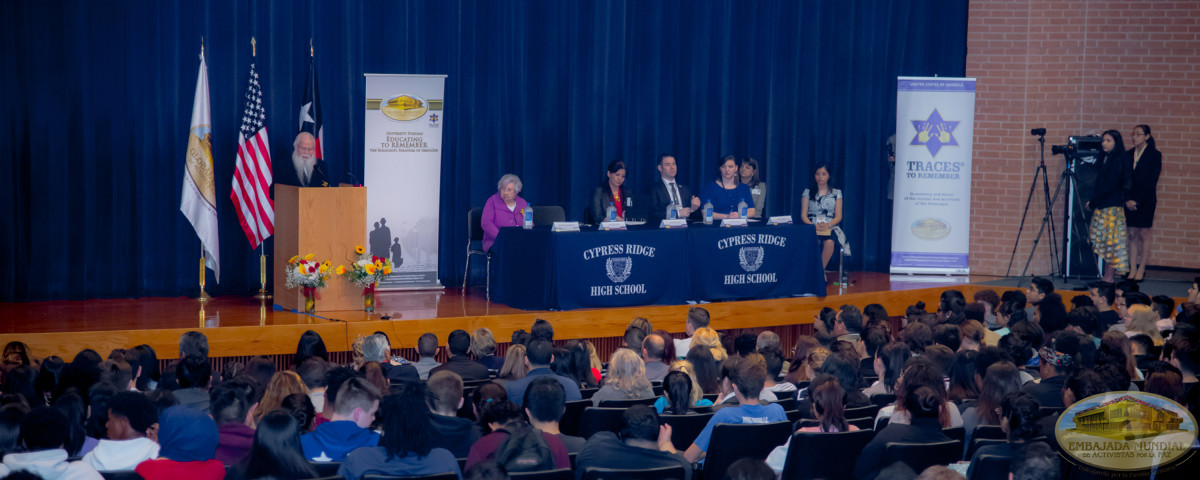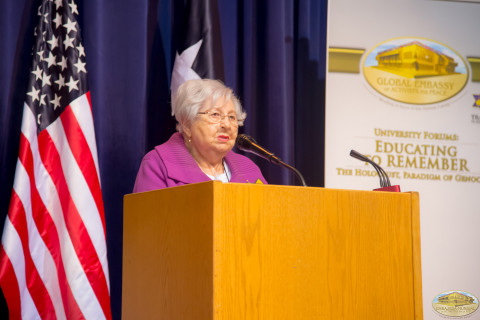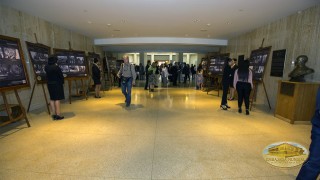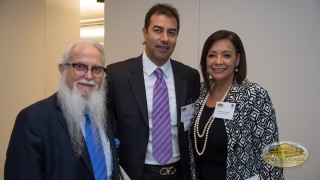Testimony of the Holocaust reaches the hearts of young people
The Educating to Remember Program uses the voice of the victims of the Holocaust as a mechanism of prevention and alarm in the face of genocidal behavior.
The educational work carried out by the Educating to Remember Program approached the youth of Cypress Ridge High School through a University Forum with the participation of: Daniel Agranov, consul general of Israel in the Southwest of the United States; Emily Sample, deputy director of Education at the Holocaust Museum in Houston; and Rose Sherman Williams, Holocaust survivor.
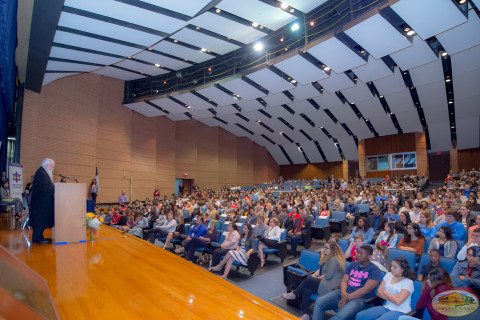
The meeting organized by the Global Embassy of Activists for Peace (GEAP), reminded the audience that the role of youths is of vital importance in the construction of a just and humanistic society.
The dissertation of the executive president of the GEAP expressed this subject, and also warned of the increase in anti-Semitism and the persecution suffered in the Middle East, insisting that the indifference of the world increases acts of barbarism; and to counter all this, he called for an education based on values.
“The development of scientific and technological knowledge is not enough to avoid the repetition of a fact as atrocious as genocide (referring to the Holocaust). Hitler carried out the Holocaust in one of the most advanced nations in technology, science and education for that time. Therefore, education with values is one of the key instruments to prevent a new genocide from recurring”.
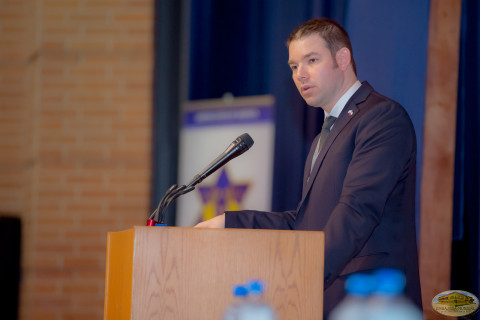 The Holocaust: Origin of the concept of genocide, an unprecedented event
The Holocaust: Origin of the concept of genocide, an unprecedented event
The consul Daniel Agranov, said that his work also includes the mission of educating on the events that took place during the Holocaust. In his speech, he shared statistics of human losses during the Nazi era in Poland, the Soviet Union, Lithuania, the Czech Republic, among others, to encourage young people to seek more stories, to document and to be interested in learning more about the Holocaust, an event without historical or conceptual precedents.
“You see, the word 'genocide' did not exist before 1944; and understanding the term genocide, we can begin to understand why the Holocaust is the unfortunate definition of that word." - Daniel Agranov.
In her mission to teach the dangers of hate, prejudice and apathy through the lessons of the Holocaust and other genocides, Emily Sample, deputy director of Education at the Holocaust Museum in Houston, took a historical tour of the origin and concept of genocide attributed to the Jewish lawyer Raphael Lemkin, because he explained that it is a word that is often used without definition or context.
She also mentioned the ten stages of the genocidal process posed by Dr. Gregory Stanton, of the Genocide Watch organization as follows: classification, symbolization, discrimination, inflection, organization, polarization, preparation, persecution, mass murder and genocide. This to emphasize that it is not until the ninth stage that killings begins.
"And now we must ask: what are we doing to help the people of Darfur and the Democratic Republic of the Congo, the Rohingya of Myanmar, the Yazidi persecuted by ISIS in Iraq and Syria? How can we help Armenians and indigenous peoples around the world to acknowledge their suffering? And how can we maintain the genocide of starting anew somewhere else? "- Dr. Gregory Stanton
A testimony of life and hope
“No matter what the condition was, we could not look down. God forbid, if the Germans noticed you looking down, you would feel the whip on your back. We had to stay and look at the people hanged, 27 people for almost, about two days. Without food, without water.”
Hunger, humiliation, degradation, sadness, exhaustion, illness and an attempt to die were the basis of her testimony, however, when it seemed that the tragedy of her life had taken away all hope of believing in humanity, she invited young people from Houston and the world:
“To high school students and children ... school children, I want to tell you: The main thing is not to be spectators. Maybe if we had not had been spectators, what happened, maybe, would not have happened. And the most important thing is that you never give up”. - Rose Williams.
The unveiling of a plaque with the shape of the Star of David contains her palm prints to keep alive the testimony of her life in present and future generations.
